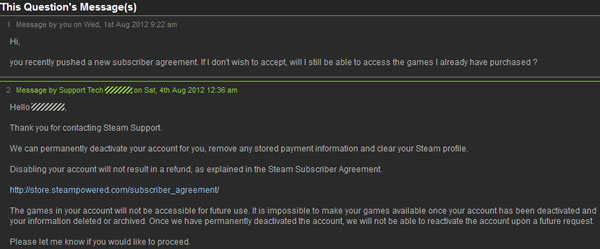The Federation of German Consumer Organizations (Verbraucherzentrale Bundesverband e.V. or VZBV) has sued Valve for not allowing Steam users to resell their games. Speaking about the policies of Valve's digital distribution service, VZBV project manager Carola Elbrecht said that if customers truly own the titles they purchase on Steam, they should have the option to resell them when they want to, just as they would when dealing with a physical card or board game – a shaky comparison, some would argue.
Elbrecht noted that although a Steam user could technically download a game, burn it to a disc and sell the physical media, the buyer generally wouldn't be able to play the title because it's likely bound to a specific account. Additionally, Valve doesn't let users transfer accounts, so legally selling an entire library is also impossible. Given those policies, Elbrecht feels consumers only have partial ownership of their games. "If I pay the full price for a game, then why am I not allowed to do with it what I want," she said.
The filing marks the VZBV's latest attempt to loosen Valve's restrictions. The group targeted Steam's lack of support for account transfers in a 2010 suit that case made it to the German Federal Court of Justice, which sided with Valve. Given that outcome, it remains to be seen how successful the VZBV's latest push will be, but the group may catch a lucky break considering the CJEU's recent ruling in favor of the ability to resell digitally distributed software. If nothing else, it will raise awareness Elbrecht said.
Speaking with PCWorld about the latest suit, Valve vice president of marketing Doug Lombardi said he was aware of the VZBV's press release about the filing, but that Valve hasn't laid eyes on the actual complaint yet. "That said, we understand the complaint is somehow regarding the transferability of Steam accounts, despite the fact that this issue has already been ruled upon favorably to Valve in a prior case between Valve and the VZBV by the German supreme court," he said, referring to the mentioned 2010 case.

In addition to pressuring Valve over the resale issue, the VZBV has criticized the company for following the lead of other industry heavyweights by banning class action suits and forcing users into an arbitration clause with an EULA update last year. The organization deemed the policy change to be a form of coercion because Valve essentially forced users to agree with the new terms by holding their accounts hostage. Without agreeing to the updated conditions, users couldn't access their accounts or games.
